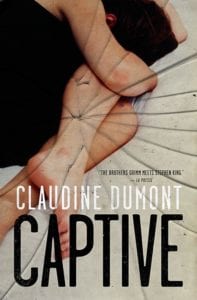
A can’t-put-it-down existential thriller from debut novelist Claudine Dumont.
Shelf Unbound: In Captive, a young woman with a dull job who has isolated herself from friends and family and drinks herself to sleep each night is captured from her apartment and wakes up in a sealed room. The setup is a contemporary spin on Sartre’s No Exit, and Captive likewise explores existential themes. What brought you to the idea of placing Emma in her concrete box?
Claudine Dumont: I put Emma in the box because I wanted to have full control over what happened to her; it was easier to imagine what could be done to accomplish the end game (life rehabilitation) with that setting.
And it was also a good way to bring the strength of adaptation that could sometimes be misconstrued for weakness or apathy.
Shelf Unbound: Emma eventually begins to adapt, running laps around the small room, doing push-ups, drawing on the wall. Her life seems fuller than it was before she was captured. Do you think she has a conscious awareness of this difference?
Dumont: Emma is not aware of what this capability of adaptation has done to her life. I wanted to explore the fact that once we adapt to a situation, we don’t see the unacceptable in it anymore. If the empty box permits her to obtain a kind of fuller life, it may be because when you get rid of everything superficial, it leaves space for the necessary.
Shelf Unbound: The ending of the book is a shock, and I won’t give it away. But did you plan that ending from the start and if so did you ever consider going in a different direction with the ending?
Dumont: The ending was decided from the start. I was reading A Million Little Pieces by James Frey, and at the beginning, when he contemplates another stay in a rehabilitation facility for his drug and alcohol addictions, I grimly thought: There should be facilities that provide rehabilitation for people who are simply wasting their life away without any kind of addiction, just by letting time slip by without doing anything meaningful for themselves. And that was the ending right there.
Shelf Unbound: You’re a portrait photographer as well. What do you find similar about taking a portrait of a person and writing a portrait of a character?
Dumont: I think that photography is the faster, easier, and more interactive way to paint a character. But I use words the same way I use digital pixels: to create (hopefully) emotional responses.
My second novel was released in French on September 17. It is called La petite fille qui aimait Stephen King (The little girl who loved Stephen King). It’s the story of two sisters and to what extreme their love for one another can go to. It’s also an homage to my favorite writer. I sure hope this one will be translated by David too!
An Interview with the Translator, David Scott Hamilton
Shelf Unbound: You’ve translated female authors in the past. What do you particularly pay attention to when translating women to make sure that you keep whatever is feminine in their voice?
David Scott Hamilton: For me the goal is always authenticity, regardless of the gender of the author, narrator or character. I simply don’t accept the feminist argument that my “male gaze” constrains my ability to render a feminine voice accurately and evocatively. Fiction is a work of imagination which demands a deep identification with the world and translating a feminine voice demands that type of deep identification.
Shelf Unbound: Dumont’s writing is very stylized—lots of short phrases. Does the experience of reading these short phrases feel different in French than in English (which by its nature is more concise)?
Hamilton: I don’t think so. Dumont’s prose is so stripped down, free of artifice and embellishment that it achieves a similar concision in the French, which transfers into English quite closely.
Shelf Unbound: I believe you find great joy in translating. What is the joy of it for you?
Hamilton: You’re absolutely right. I derive an exquisite pleasure from this work. I think it’s because literary translation is, at its core, a slow and meticulous performance art, much akin to the performance of a long and complex musical score. I was once an aspiring young musician, but I abandoned those dreams because I could never “get it right.” The beauty of performing a literary text is watching your interpretation of the composer’s work unfold before you, but most importantly, having the time to get it right.
Shelf Unbound: What have you learned about the art of writing through translating other writer’s works?
Hamilton: Humility. As a writer, translating the work of others puts me in an interesting situation. The work I produce is mine but it’s not mine, and my authorship will remain invisible to most readers, as it arguably should. What I can claim as mine is the integrity of the English text, which demands a mastery of all the elements of style that comprise that text. In a sense, a literary translation is an exercise in pure style and, more than anything, writing through the eyes and voices of other writers has allowed me to convey the tone, colour and rhythm of a given text with greater confidence.
